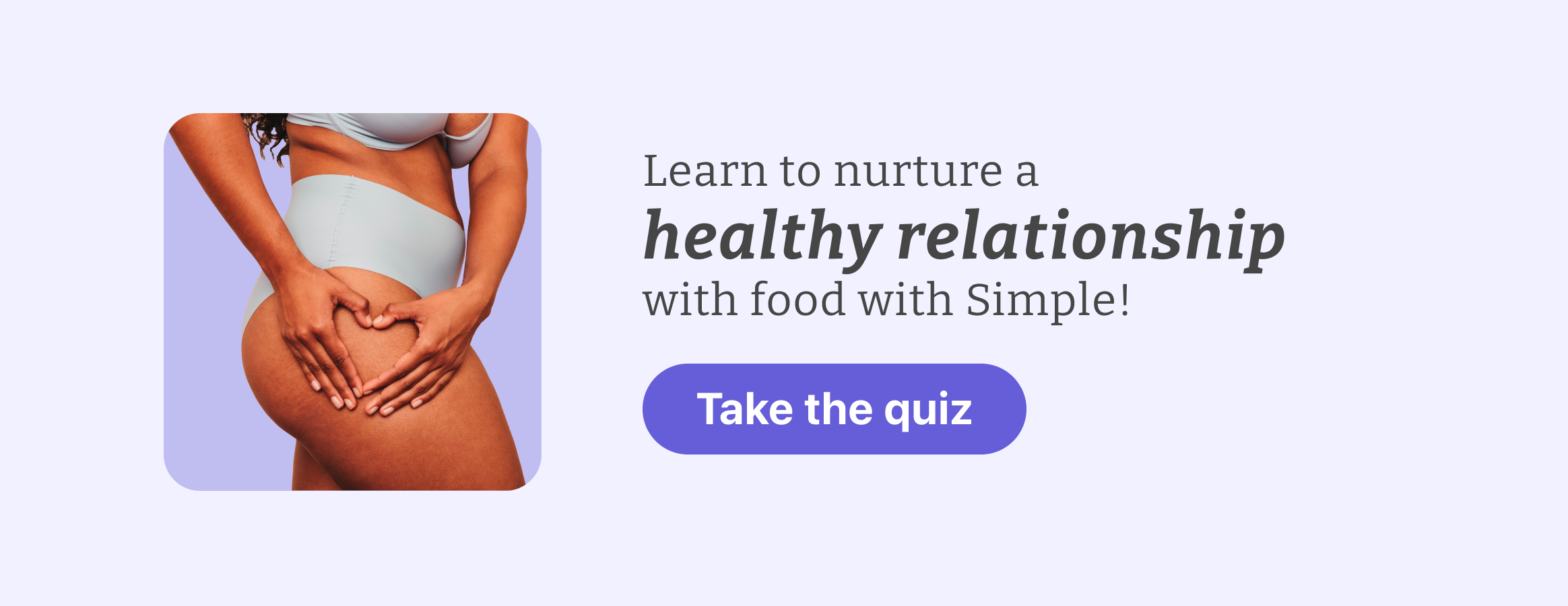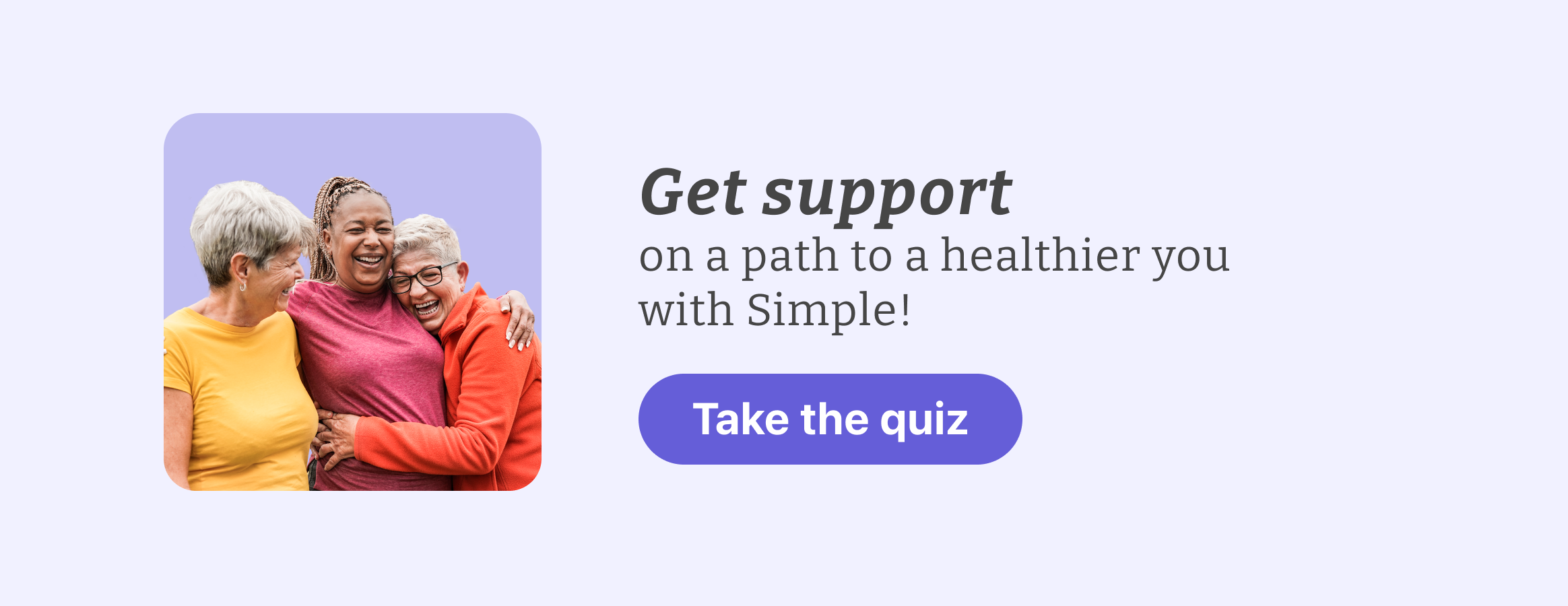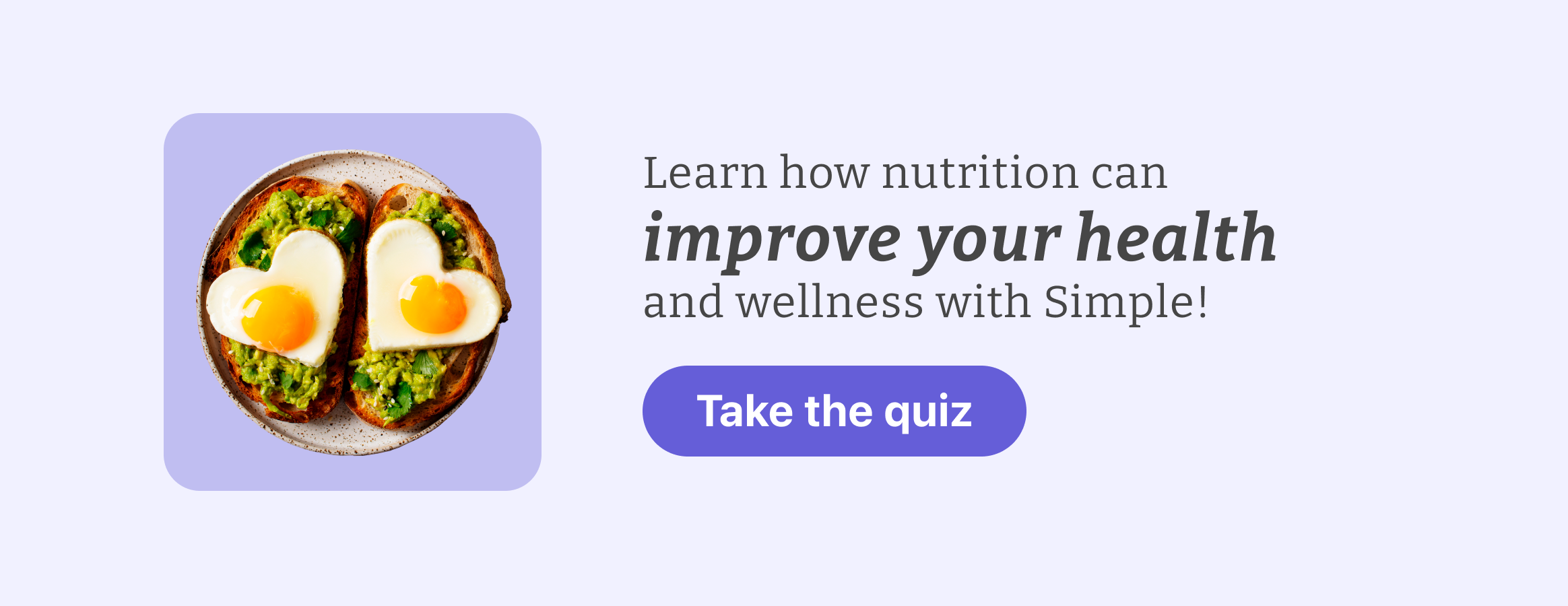Simple’s tips to address binge eating

If you struggle with binge eating, you aren’t alone.
Many people have had the experience of eating a lot in a short time while feeling out of control. This experience can make you feel guilty, ashamed, overwhelmed, and confused — while vowing never to do it again. Until the next time it happens … and then the cycle begins again.

For some people, binge eating goes beyond the occasional overindulgence. They might meet the criteria for a diagnosis of binge eating disorder (BED), which is a clinical disorder.
While general binge eating might be an infrequent occurrence due to stress or special occasions, BED involves regular, uncontrollable episodes of excessive eating, even when not hungry, often accompanied by feelings of guilt and shame.
In this article, we’ll look at understanding binge eating more, with some tips that could help you feel more compassion toward yourself as you go through this and feel more hopeful that you can change.
We’ll also look at what BED is, but for more information and advice on overcoming this, you’ll want to speak with your healthcare provider.
[Learn to nurture a healthy relationship with food with Simple.]
Important: This article is for informational purposes only. Binge eating disorder (BED) is a clinical disorder that usually requires professional help to work through. If you have concerns and/or these symptoms sound familiar, please consider consulting with an appropriate healthcare professional specializing in disordered eating.
The spectrum of binge eating
Almost everyone overeats sometimes.
Whether it’s all-inclusive vacation buffets, family get-togethers, overshooting portion control after a day of missing meals, or any other reason — most people will, at least occasionally, eat more than their bodies need (or more than is comfortable for their stomachs).
Binge eating is different.[1]
Sometimes, it’s overeating excessive amounts in one sitting — much more than you would typically eat in a meal or even in a day. This is known as objective binge eating.
Sometimes, it’s not actually overeating but eating a portion that would be considered normal (such as a sandwich). This is known as subjective binge eating: you haven’t eaten excessively, but your experience is “bingey.”
What defines binge eating disorder (BED)?
What defines binge eating the most are the feelings.
A binge feels like an overwhelmingly compelling urge to eat and like losing control when you do eat. Afterward, you might feel guilty, depressed, ashamed, and — of course — physically uncomfortable.[2]
No matter how much you eat, you may have an issue with binge eating if you’re frequently preoccupied with feelings of guilt, regret, and shame after eating.
Again, this is on a continuum.
- Some people may experience this only occasionally, such as during times of stress.
- Other people may find that this behavior shapes their whole life.
In the latter case, this then becomes binge eating disorder (BED).
You may have a binge eating disorder if:
- You often feel out of control and can’t stop eating.
- You eat very fast during a binge.
- You often eat beyond feeling full.
- You often eat in secret and hide your binge foods and/or behaviors from others.
- You often feel depressed, guilty, or disgusted after eating.
- Your eating episodes disrupt your life significantly — for instance, causing problems with work, family, school, etc., and other aspects of everyday functions.
Officially, a diagnosis of BED according to DSM-5 requires these to occur at least once per week over 3 months, and this must be diagnosed by a trained healthcare professional.[3,4,5]
Anyone can have a BED no matter their weight, age, or gender.
If these symptoms sound familiar, consider getting support and guidance from a healthcare professional.
What contributes to binge eating disorders?

Binge eating is complex. Many factors contribute, and we are still learning about this area through emerging research.
Importantly, binge eating is NOT caused by people being “lazy,” “weak-willed,” or “lacking motivation.” (In fact, most people have tried very hard to control their binges, which often makes the situation worse.)
Rather, evidence suggests that there are underlying physiological, psychological, social, and environmental factors that can combine to create and maintain the disorder.[6,7]
Physiological factors
Binge eating is more likely to occur when people have been over-restricting their dietary intake, so their brain tries to compensate by increasing appetite and decreasing satiety signals.[8]
There’s also some research linking binge eating with dopamine; in other words, binging could give some people a way of release, but more research is required to fully understand this relationship.[9]
Psychological and cognitive factors
People who struggle with binge eating may have differences in the way their brains process information, such as:[6]
- paying more attention to food and food cues
- feeling less of a reward from normal eating
- exhibiting increased focus on “right now” and less focus on future consequences
- having higher levels of impulsivity and compulsive urges (similar to what happens with other addictive behaviors)
Binge eating is a way for many people to compensate for difficult and painful feelings, like feeling depressed, worried, bored, angry, or sad.[10,11]
People who have experienced trauma and adverse childhood experiences are more likely to struggle with disordered eating, likely as a way to help themselves calm down and self-soothe.[12,13,14] Other researchers have suggested that binge eating is also a self-protective way to “check out” and dissociate after trauma.[12] (If you’ve ever had the feeling of “waking up” after a binge episode and wondering, “What just happened?” this may sound familiar.)
People who create strict “food rules” (such as “good” and “bad” foods) and harsh punishments for breaking those rules (such as self-criticism) are also more likely to struggle.
Social factors
It can be hard to feel judged by others. The cultural pressure to have a certain type of body, combined with feeling “not good enough,” can trigger emotional eating and binging.
Here, both the “real people” that are close to us and social media can play a role.[10] Feeling isolated, disconnected, cut off, and/or inadequate compared to others creates emotional stress that can make the situation worse.
Environmental factors
Researchers call them “daily hassles.” You probably know them well: traffic, noise, pollution, irritating inconveniences, your boss yelling at you, and all the other annoyances and hangups of everyday life.
These “daily hassles” are closely linked to coping behaviors like binge eating.[15]
[Take your first step towards self-care and healthier eating habits with Simple.]

Self-care steps for binge eating
Here are a few simple, scientifically proven ways to help you care for and support yourself to overcome any episodes where you may overeat.
Get support.
If you struggle with overeating, you’re not alone. The first step is to discuss your behaviors and tendencies with your healthcare provider to ensure nothing more serious is going on. A trained psychologist, counselor, or other medical professional can help you manage the deep-rooted feelings that could cause you to overeat.
Practice self-compassion.
While harsh self-criticism seems like it would work, it makes things worse by further increasing stress and painful feelings.[13]
Instead, try befriending yourself with some kindness, just like you would for a loved one who was suffering. Research suggests that people who practice self-compassion have fewer and less intense overeating episodes.[16,17,18]
Build your self-awareness.
A binge often feels like it “comes out of nowhere,” but it doesn’t. There are usually events, thoughts, feelings, and situations that lead to it.
After eating too much, reflect. Take some notes. What was happening in the hours leading up to the episode? What were you feeling, thinking, and/or doing?
Over time, look for patterns.
Slow down.
You may not be able to stop yourself once the urge to eat a lot takes over. But see if you can at least slow yourself down.
Often, just a few seconds of slowing the pace of your eating can help you “check back in.” Try taking one deep, slow breath between each bite. (Yes, this will be hard!) Tell yourself that the food will wait for you.
You might discover that using this technique, you might still binge but eat less and feel more able to regulate yourself sooner.
Eat enough nutrients and energy more frequently

When you let yourself get overly hungry, especially if you follow restrictive “diets,” you create a situation that can cause you to overeat. It’s not a lack of control; it’s your biological need for food.
If you’ve been fasting and notice yourself losing control when you are eating, it’s important to look at adjusting your eating window and making sure that you are prioritizing nutritionally balanced meals frequently.
In particular, aim to eat enough:
- Protein, which helps support satiety and maintain muscle strength.[19] Examples include eggs, chicken, fish, tofu, and tempeh.
- Slow-digesting carbohydrates, which help tell the body you have enough energy and provide you with additional nutrients, including fiber. Examples include oats, quinoa, sweet potatoes, and buckwheat.[20]
- Fiber, which also helps satiety and feeds gut bacteria, helping you to stay healthy.[21] Examples include fruits and vegetables.
- Healthy fats, particularly omega-3s, which are anti-inflammatory, helping to reduce your risk of conditions such as heart disease.[22] Examples include oily fish like salmon, avocado, and olive oil.
Build a sleep-supporting bedtime routine.
All of us are worse when we’re overtired. But if you struggle with binge eating, not getting enough sleep will make it harder for you to regulate your mood and your behaviors.[23]
Look ahead at your planned bedtime, and then spend the 30–60 minutes before that time winding down with calming activities that truly comfort and relax you.
Reach out and connect.
Binge eating can be isolating, especially if we feel ashamed and try to hide it. There are online or in-person support groups where you can share your experiences with others who are on the same journey as you.
Surround yourself with people who have a positive influence. Nurture relationships with people that help you feel good about yourself.
And remember that a phone call or a walk with a friend or loved one might be just the thing that disrupts the pattern.
Address your stress.
We can’t do much about many stressors. But we can adjust our responses to them — as well as cut down on other stressors that might be within our control (such as saying “yes” to one more obligation).
Find stress-relieving techniques that work for you and participate in them often.
For instance, soak in a warm bath, spend time in nature, snuggle a pet, read a book you enjoy (or heck, write your own), exercise, or meditate.[24] Make something like art or a craft.
These activities (and others like them) all help lower stress levels and prevent binge eating.
Importantly, try to do these as “preventive regular maintenance” before you’re in the worst of the stress response, feeling like you’re flailing and overwhelmed.

Review your social media and screen habits.
What makes you feel better?
Maybe it’s that educational documentary, caring online support group, or hilarious meme thread that always makes you laugh.
Consider keeping these in your entertainment roster.
What makes you feel worse?
Maybe it’s those true crime dramas that leave you paranoid, the “fitspiration” influencers that make you feel like a wet slug, or the internet arguments that spike your heart rate as you smash the keyboard.
Consider consuming LESS of this.
Care for your body as best you can.
You might not be feeling the self-love. But you can still do the basics of self-care: take a shower, brush your teeth, drink some water, get some fresh air, book your medical appointments, etc.
Remind yourself that bodies come in all shapes and sizes, that you’re doing your best, and that you’ll find ways to support your health and well-being, even if it isn’t “perfect.”
Likely not. It may be wise to pause any intermittent fasting until you’re making progress on binge eating episodes.
However, practicing mindful eating and slowing down to be present is always a good idea, no matter what.

- Mathes WF, Brownley KA, Mo X, Bulik CM. The biology of binge eating. Appetite. 2009 Jun;52(3):545–53.
- Giel KE, Bulik CM, Fernandez-Aranda F, Hay P, Keski-Rahkonen A, Schag K, et al. Binge eating disorder. Nat Rev Dis Primers. 2022 Mar 17;8(1):16.
- Hilbert A. Binge-eating disorder. Psychiatr Clin North Am. 2019 Mar;42(1):33–43.
- American Psychiatric Association D. Diagnostic and statistical manual of mental disorders: DSM-5 [Internet]. academia.edu; 2013 [cited 2023 Sep 6]. Available from: https://www.academia.edu/download/38718268/csl6820_21.pdf
- World Health Organization. International Classification of Diseases 11th Revision (ICD-11): 6B82 Binge eating disorder [Internet]. [cited 2023 Sep 6]. Available from: https://icd.who.int/en
- Kessler RM, Hutson PH, Herman BK, Potenza MN. The neurobiological basis of binge-eating disorder. Neurosci Biobehav Rev. 2016 Apr;63:223–38.
- Keski-Rahkonen A. Epidemiology of binge eating disorder: prevalence, course, comorbidity, and risk factors. Curr Opin Psychiatry. 2021 Nov 1;34(6):525–31.
- Burton AL, Abbott MJ. Conceptualising binge eating: A review of the theoretical and empirical literature. Behav Change. 2017 Sep;34(3):168–98.
- Yu Y, Miller R, Groth SW. A literature review of dopamine in binge eating. J Eat Disord. 2022 Jan 28;10(1):11.
- Ely AV, Cusack A. The binge and the brain. Cerebrum. 2015 Oct 1;2015.
- Dingemans A, Danner U, Parks M. Emotion regulation in binge eating disorder: A review. Nutrients. 2017 Nov 22;9(11).
- Palmisano GL, Innamorati M, Vanderlinden J. Life adverse experiences in relation with obesity and binge eating disorder: A systematic review. J Behav Addict. 2016 Mar;5(1):11–31.
- Brewerton TD. An overview of trauma-informed care and practice for eating disorders. J Aggress Maltreat Trauma. 2019 Apr 21;28(4):445–62.
- Trottier K, MacDonald DE. Update on psychological trauma, other severe adverse experiences and eating disorders: State of the research and future research directions. Curr Psychiatry Rep. 2017 Aug;19(8):45.
- O’Connor DB, Jones F, Conner M, McMillan B, Ferguson E. Effects of daily hassles and eating style on eating behavior. Health Psychol. 2008 Jan;27(1S):S20–31.
- Serpell L, Amey R, Kamboj SK. The role of self-compassion and self-criticism in binge eating behaviour. Appetite. 2020 Jan 1;144:104470.
- Braun TD, Park CL, Gorin A. Self-compassion, body image, and disordered eating: A review of the literature. Body Image. 2016 Jun;17:117–31.
- Rahimi-Ardabili H, Reynolds R, Vartanian LR, McLeod LVD, Zwar N. A systematic review of the efficacy of interventions that aim to increase self-compassion on nutrition habits, eating behaviours, body weight and body image. Mindfulness. 2018 Apr 1;9(2):388–400.
- Wirth J, Hillesheim E, Brennan L. The role of protein intake and its timing on body composition and muscle function in healthy adults: A systematic review and meta-analysis of randomized controlled trials. J Nutr. 2020 Jun 1;150(6):1443–60.
- Campos V, Tappy L, Bally L, Sievenpiper JL, Lê KA. Importance of carbohydrate quality: What does it mean and how to measure it? J Nutr. 2022 May 5;152(5):1200–6.
- Barber TM, Kabisch S, Pfeiffer AFH, Weickert MO. The health benefits of dietary fibre. Nutrients. 2020 Oct 21;12(10).
- Schwingshackl L, Zähringer J, Beyerbach J, Werner SS, Heseker H, Koletzko B, et al. Total dietary fat intake, fat quality, and health outcomes: A scoping review of systematic reviews of prospective studies. Ann Nutr Metab. 2021 Mar 31;77(1):4–15.
- Takano Y, Iwano S, Aoki S, Nakano N, Sakano Y. A systematic review of the effect of sleep interventions on presenteeism. Biopsychosoc Med. 2021 Nov 17;15(1):21.
- Meredith GR, Rakow DA, Eldermire ERB, Madsen CG, Shelley SP, Sachs NA. Minimum time dose in nature to positively impact the mental health of college-aged students, and how to measure it: A scoping review. Front Psychol. 2019;10:2942.
